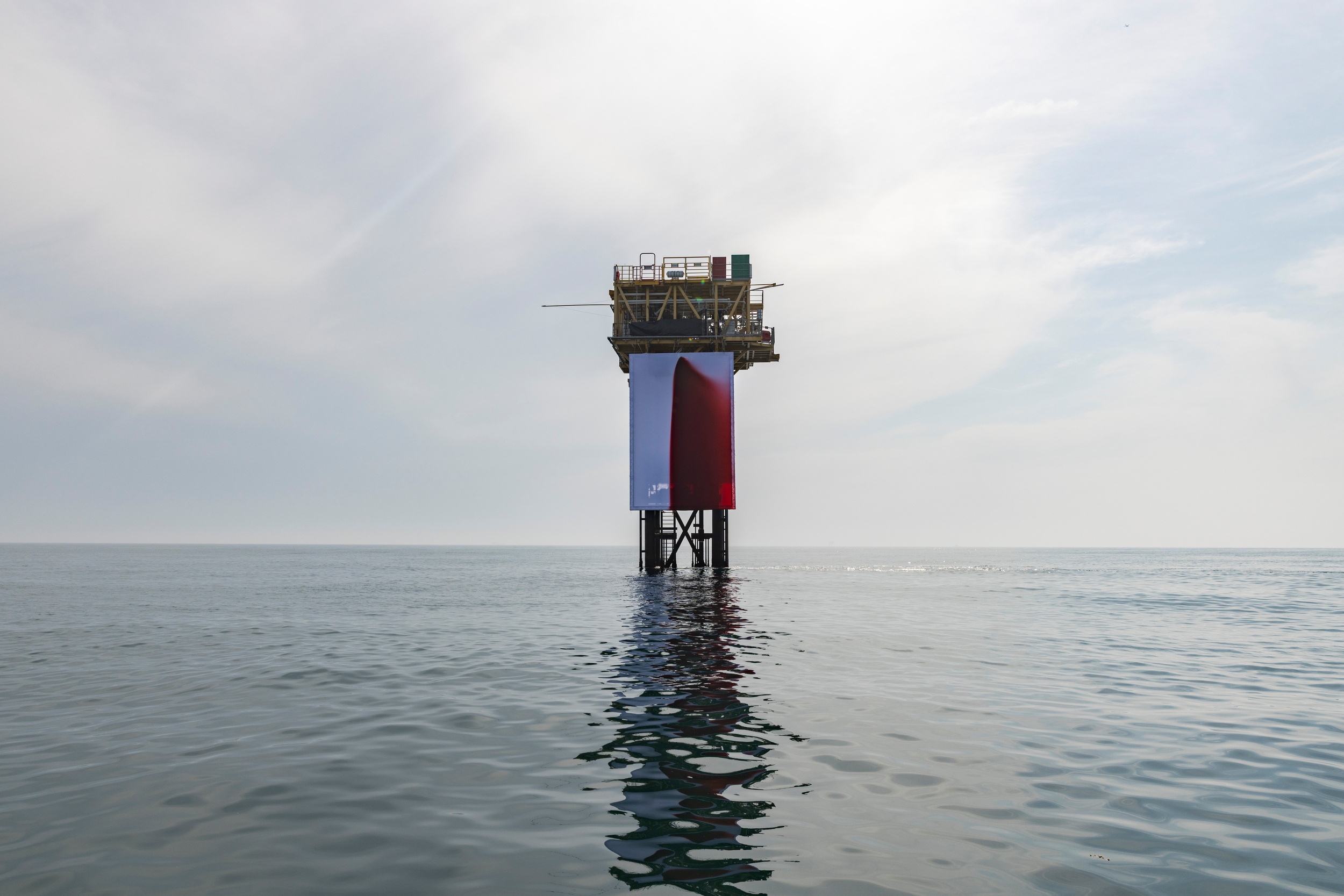
- Press Release
Activists install giant new artwork by Anish Kapoor onto Shell platform as heatwave rages on
Greenpeace climbers have installed a major new work by renowned artist Anish Kapoor onto a Shell platform in the North Sea – the world’s first artwork to be installed at an active offshore gas site.
Kapoor’s work, titled BUTCHERED and conceived for this action, is unveiled at the same moment as devastating heatwaves, wildfires and floods fuelled by the fossil fuel industry have hit communities in the UK and around the world.
To install the artwork, seven highly experienced Greenpeace climbers boarded and safely scaled Shell’s gas platform Skiff, 45 nautical miles off the Norfolk coast, yesterday [1]. After securing a giant 12m x 8m canvas to one side of the structure, the activists hoisted a high-pressure hose on top of the canvas at a height of 16 metres above the sea. They then pumped 1,000 litres of blood-red liquid that gushed into the fabric, creating a vast crimson stain.
The blood-like solution, designed specifically for this artwork, is a mix of seawater, beetroot powder and non-toxic, food-based pond dye [2].
BUTCHERED is a stark visualisation of the wound inflicted on both humanity and the Earth by the fossil fuel industry, evocative of our collective grief and pain at what has been lost, but also a cry for reparation.
It comes as the fourth heatwave of the summer has triggered health alerts in parts of the UK, while a worsening drought has hit farmers’ crops and record-breaking wildfires have burnt an area twice the size of Glasgow. Extreme heat is also breaking temperature records across Europe and fuelling massive wildfires in Spain, where thousands of people have been evacuated. Earlier this month, deadly flash floods hit communities in China and northern India.
Commenting on the artwork, Anish Kapoor said:
“The carbon dioxide released by burning fossil fuels is invisible, but we are witnessing the devastation that its extraction wreaks on our world. What still remains largely hidden is the responsibility oil giants like Shell bear for causing this destruction and profiting from worldwide suffering. I wanted to make something visual, physical, visceral to reflect the butchery they are inflicting on our planet: a visual scream that gives voice to the calamitous cost of the climate crisis, often on the most marginalised communities across the globe.
“BUTCHERED is an action that happens at the place where this violation starts – a gas platform in the middle of the sea. BUTCHERED attempts to bring home the horror, giving voice to the moral and physical destruction caused by ruthless profiteers. My work BUTCHERED is also a tribute to the heroic work done in opposition to this destruction, and to the tireless activists who choose to disrupt, disagree and disobey.”
Shell made £54 billion in profits in the two years after the invasion of Ukraine, but it paid just £1.2 billion in taxes in the UK over the same period, about 2% of its global earnings. The carbon pollution unleashed by Shell over three decades is estimated to have already caused at least $1.42 trillion worth of climate damage around the world [3]. And despite clear warnings from scientists and energy experts, the oil giant is still planning a major expansion of its operations, with 700 new oil and gas projects in the pipeline [4].
Low and middle-income countries are the most vulnerable to the adverse effects of the climate crisis, including rising sea levels, floods, storms and heatwaves. This is despite many Global South countries contributing just a fraction of global greenhouse gas emissions when compared to wealthier nations and oil giants like Shell [5].
Philip Evans, Senior Campaigner at Greenpeace UK, said:
“Extreme weather is hitting close to home, but the extraction of fossil fuels driving the climate crisis is often out of sight. This artwork is a visual gut-punch that makes visible the suffering and damage caused by the oil and gas industry right at the place where the harm begins. While the fossil fuel sector makes billions from climate destruction, ordinary people are left to pick up the rising costs of flood damage, droughts and wildfires. Governments need to start holding oil giants like Shell to account and make them pay for the enormous damage they are causing.”
Anish Kapoor is the latest figure to join the Polluters Pay Pact, a global Greenpeace initiative backed by firefighters, political leaders, unions, humanitarian groups and tens of thousands of people, calling on governments to make big polluters pay for the climate damage they’ve caused.
The UK government can make this happen by placing bold new polluter taxes on oil and gas companies, such as a tax on fossil fuel extraction and taxes on shareholders in fossil fuel firms. This will raise urgently needed funds for climate-impacted communities at home and abroad [6]. A global survey shows nearly eight in 10 people (79%) in the UK and 81 per cent globally believe governments must tax oil, gas and coal corporations for the environmental damages they cause.
This is not the first time Anish Kapoor has challenged the fossil fuel industry. In 2019, he joined other artists in calling on London’s National Portrait Gallery to cut ties with oil giant BP.
– ENDS –
Photos and videos of the installation and artwork can be found here.
Contact: Greenpeace UK news team at press.uk@greenpeace.org and 020 7865 8255
Notes:
[1] The Greenpeace climbers are using gas monitors and spark-free ATEX gear, and keeping clear of the high-risk zones on the platform. They’re following industry safety standards.
[2] The ‘blood’ used to create the work is predominantly made from seawater, combined with beetroot powder, organic decaf instant coffee granules and a biodegradable, food-based pond dye. The combination is non-toxic and biodegradable and will rapidly disperse. For the safe use of the hose, Greenpeace consulted with an active firefighter.
[3] From a study published in Nature: https://phys.org/news/2025-04-world-biggest-companies-trillion-climate.html
[4] Research by Global Witness and Friends of the Earth Netherlands: https://en.milieudefensie.nl/news/how-shells-oil-and-gas-plans-continue-to-worsen-climate-crisis
[5] According to a leading study, over the last 150 years, taking population size into account, countries in the global North have been responsible for 92% of excess emissions – with the remaining 8% coming from the global South. The US and the European Union alone make up 69% of the total. (Hickel, J. 2020).
By 2030, loss and damage is estimated to cost developing countries between USD 290-580 billion per year. Yet it has been estimated that the fossil fuel industry made enough super-profits between 2000 and 2019 to cover the costs of climate-induced economic losses in 55 of the most climate-vulnerable countries nearly 60 times over.
[6] The ‘Climate Damages Tax’ report, backed by over 100 climate organisations worldwide including Greenpeace, Stamp Out Poverty, Power Shift Africa and Christian Aid, calculated that a tax on the extraction of fossil fuels in OECD countries could raise $900 billion by the end of the decade to support the world’s most vulnerable facing climate damages, at home and abroad.
